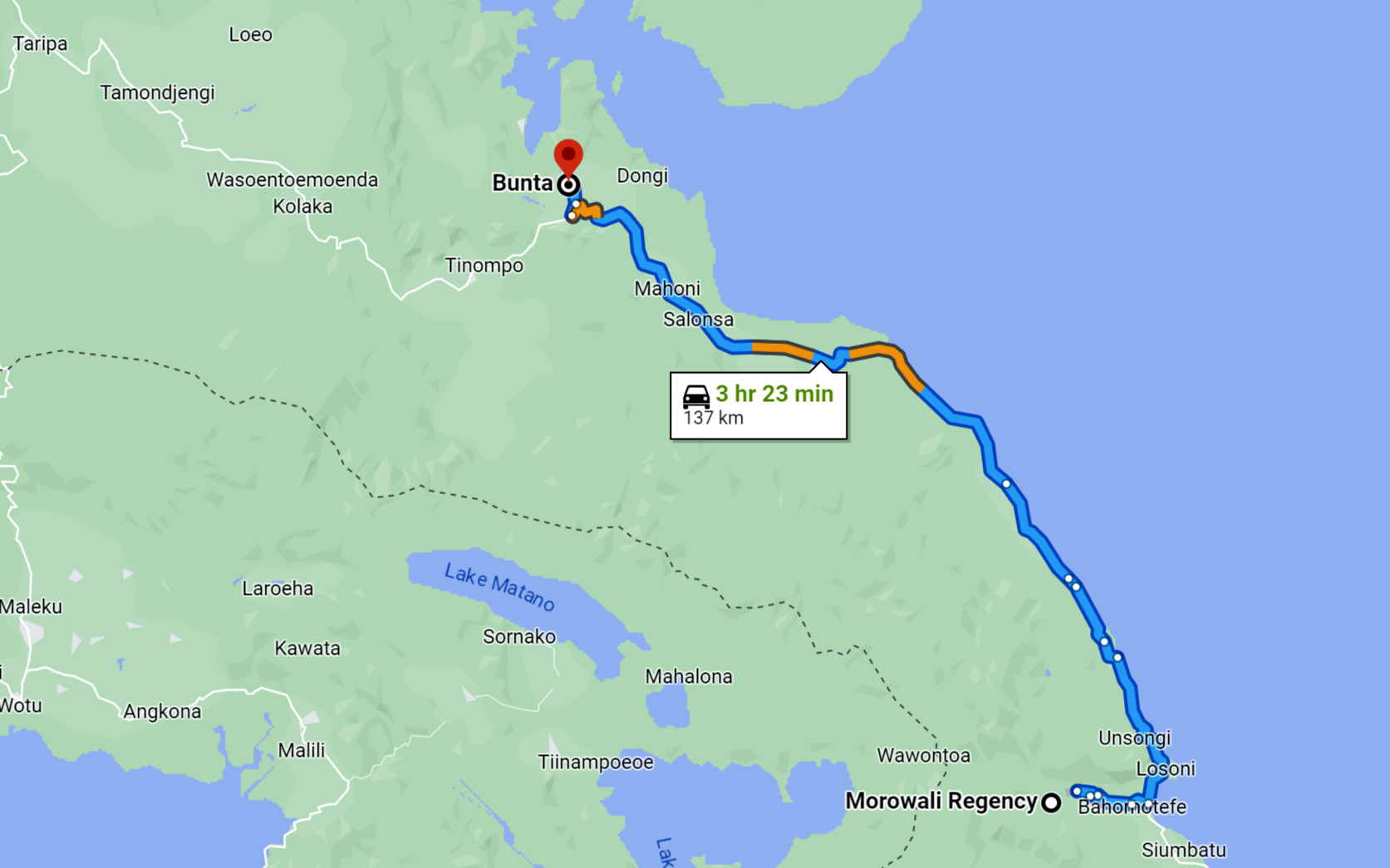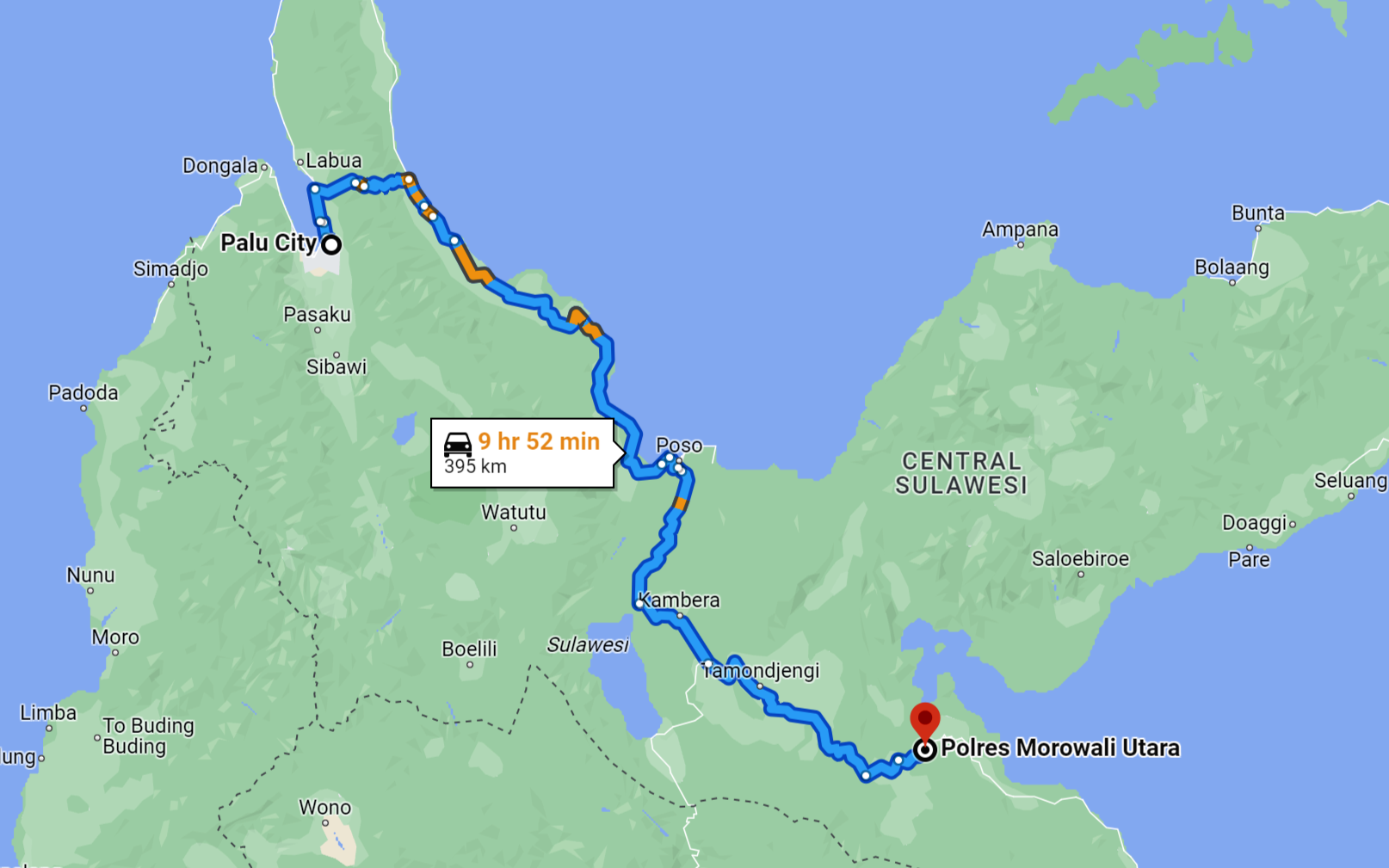Fatalities, Work Accidents, Union Suppression and Worker Criminalization: The Fate of Indonesian and Chinese Workers at the PT GNI Nickel Smelter Pt6
By Permata Adinda and Muammar Fikrie for Project Multatuli, May 26, 2023
[Content warning: This article contains references to self-harm.]
Chinese Workers
Among tens of thousands of workers, there are at least more than a thousand Chinese workers at PT GNI. We interviewed one former worker, identified only as V to protect his identity, who used to work as a heavy equipment operator.
Along with other Chinese workers, V landed in the northern Sulawesi city of Manado from China, then flew to Morowali, and traveled by land to North Morowali.
Only on arrival in Morowali did V realize that four people from his group had died on their way to PT Virtue Dragon Nickel Industri in Konawe Regency in South Sulawesi. “Their boat capsized. Four people died that night,” V recounted. “At the time, PT GNI warned them not to talk about the incident. If anyone spoke to anyone they wouldn’t be able to go home.”
V has been subjected to wage deductions three times by his supervisor, each time 20,000 CNY, or around Rp42 million ($2,800). V suspects that the superiors or the company intentionally looked for reasons to cut the salaries of Chinese workers. “We weren’t fined for our mistakes but only because the fines would have benefited the company or certain individuals.”
V was supposed to work for a year, but they were detained by the police after criticizing the company on WeChat, a widely used Chinese social media platform.
V commented on a post on WeChat about Chinese workers struggling to return home, and Chinese workers’ complaints about long working hours being met with intimidation and violence.
V was then arrested by Indonesian police and taken to the police station. Based on photo’s posted online, V was detained at the North Morowali Regency police station. He was held for 26 days without the presence of a translator or lawyer. In order to be released, V had to sign a document prohibiting them from making negative comments about PT GNI. Initially refusing, he was threatened with not being released from jail.
At the police station, V met another Chinese worker, identified here as Z, who was detained 10 days after posting a photo of Chinese workers hanging themselves in the plant complex on a WeChat group.
Because of his post, Z was beaten by PT GNI security officers and then detained by the police. Z showed photos of lacerations to his head. Z said the company cut his wages to cover his expenses while at the police station, with the money being handed over to the North Morowali Regency police station.
Working in Indonesia was a traumatic experience for V. Besides being a victim of intimidation, V often heard information about fellow Chinese workers who vanished. Some died on their way to Indonesia, some in work accidents, and some committed suicide.
“We who are still alive can speak to you, but who cares about those who are missing and dead?” asked V.
ACCIDENTS involving Chinese workers at PT GNI, such as falling from heights and workers being crushed by heavy equipment loaders, have been witnessed by Indonesian workers in the power plant construction division. But they said the thing that distinguished Indonesian and Chinese workers was the “many” cases of Chinese workers committing suicide.
A Chinese worker, through an interpreter, once complained that his wages and the wages of friends hadn’t been paid by the company for six months and that they couldn’t go home.
“They said they were tired here. Pressured. It’s not what was promised when they came here.”
Information about Chinese workers’ suicides spreads on WeChat. An article refers to Indonesia as the “Islands of the Dead”. The article includes photos and information about two Chinese workers who hanged themselves within three weeks in May 2022.
“The company did not investigate the cause of death. The company instead imposed a ban on photographing and disseminating incidents of deaths or any other future negative events,” the article read.
At the beginning of the COVID-19 pandemic, Chinese workers had difficulty returning to their country. The company did not honor promises to cover their return costs.
A Chinese resident living and married in Indonesia, using the pseudonym Vincent for security reasons, raised donations from volunteers to help Chinese workers who are trapped in Indonesia.
When Chinese workers wanted to return and transit in Jakarta, volunteers provided food and connected them with lawyers in China. Vincent said their volunteer group has helped more than 500 Chinese workers from Sulawesi, most of whom worked at nickel smelter companies.
On average, those working at nickel smelters are 40 to 50 years old. Most have families and are main breadwinner.
“They have children at home. They have parents to take care of.”
They came to Indonesia to seek a better income. But once they arrived the reality did not match the promises. Some workers don’t receive valid work visas for Indonesia. Many of them only relied on tourist visas.
“It’s not just one or two people who don’t have work visas, it’s lots of them. Somehow they manage to work. I don’t understand how they can work in Indonesia without work visas.”
The workers sleep with 10 other workers in one room. Food is provided by the company. Some companies provide decent meals, some don’t. On average, Chinese workers spend 10-12 hours per day working, some work even more than 12 hours per day.
Even though they’ve working, their wages may not be paid on time, with delays of happening of 3 to 6 months. Some still haven’t received their full wages even by the time they have returned to China.
“Some companies lie. They say, ‘When you return, we’ll give you your wages.’ But when they return, there’s no information. The company disappears. So the workers have to find legal aid in China,” Vincent said.
Vincent’s introduction to the issue of Chinese workers in Indonesia began with posts on WeChat. From talking to people Vincent found that some companies deliberately kept Chinese workers from returning home immediately. In the period from 2021 to 2022, flight schedules to China were still limited. The prices soared. One trip could cost Rp100 million ($6,700).
“Before the Chinese workers came to Indonesia, companies promised to buy return plane tickets. But because the ticket prices were too high companies made excuses for not buying the tickets. So, many workers couldn’t return to China even when their contracts ended,” Vincent said.

The average contract for Chinese workers is 6 months, at most a year. After the contract ends, they have to extend their stay in Indonesia without a job. “They stay in Jakarta for 6 to 10 months but they can’t afford the hotel costs. They have no money because they’re not paid.”
“When they stay in hotels, their living conditions can be very difficult. Some of them can only afford instant noodles for a month,” Vincent recounted.
Since the COVID-19 pandemic subsided, the price of plane tickets has normalized and there are more flights. However, cases of controlling workers, cutting and withholding Chinese workers’ wages, are reportedly still rampant.
“Flight tickets have become more affordable, making it easier for Chinese workers to return. But the company still has the power to decide when a worker can return to China. And Chinese workers still experience various forms of violence without strict law enforcement making the companies accountable,” explained China Labor Watch1.
China Labor Watch
To Project Multatuli, China Labor Watch sent several documents on incidents of work accident at PT GNI. For example, on March 8, 2023, a Chinese worker in the smelter furnace section died while operating an electric hoist. He slipped from the third floor.

According to PT GNI’s official notification, the management blamed the Chinese worker for “lacking awareness” of safety while working. The Mandarin-language document stated: “When operating the electric hoist, he did not pay attention to his surroundings and did not close the safety gate, resulting in him stepping into the air and falling from the third floor to the ground floor.”
In the official document, PT GNI did not conduct an external investigation into the incident so “we cannot evaluate to what extent the accident was caused by the worker’s negligence,” wrote China Labor Watch.
In the cases of the deaths of Mr. I Made Defri Hari Jonathan and Mr. Nirwana Selle, China Labor Watch suspects that compensation money from PT GNI management to the families had been taken from penalties or wage deductions of a number of Chinese workers and labor supervisors.
There are 17 Chinese workers who were penalized, ranging from 3,000 CNY-20,000 CNY, totaling 129,000 CNY, or around Rp273 million ($18,200).
The problem, said China Labor Watch, is “to what extent these workers are responsible for the accidents?”
China Labor Watch has difficulty tracking and documenting cases of Chinese worker being killed at PT GNI. So far PT GNI management has not been transparent in reporting work accidents. To obtain information about work accidents, China Labor Watch usually relies on workers who share the information via social media.

The company’s non-transparent attitude is accompanied by control over the use of social media and restrictions on the freedom of expression of Chinese workers, as happened to V. If a worker is found to have posted content that is deemed to tarnish the company’s image, they risk being penalized or illegally detained.
We confirmed stories of workers who had been detained at the North Morowali Regency police station with the regency Police Chief AKBP Imam Wijayanto. His response was that he could not confirm or deny the stories.
“I assumed the position of police chief on January 14, 2023,” he said. He asked about the identities and cases of the PT GNI workers who were arrested, while adding, “Please report about the story in a balanced way.”
Vincent still writes stories about Chinese workers in Indonesia for the WeChat page. “If there are no articles and no news, no one will know about their condition. Even when they disappear, or commit suicide, no one will be aware,” said Vincent.
“No one can touch these companies, neither the Chinese nor Indonesian governments. There are no consequences for them.” (Continued..)
This article is based on https://projectmultatuli.org/kematian-kecelakaan-kerja-pemberangusan-serikat-kriminalisasi-nasib-pekerja-indonesia-dan-tiongkok-di-industri-smelter-nikel-pt-gni/.
Featured image credit: Tropical Rainforest in Indonesia By Rhett Ayers Butler https://www.butlernature.com/2022/01/04/whats-the-outlook-for-tropical-rainforests-in-2022/
In related news:
- Profile of PT GNI in North Morowali where 2 workers died during clashes
- https://www.kompas.com/tag/bentrok-pekerja?page=2
- https://www.tempo.co/search?q=GNI
- https://bisnis.tempo.co/read/1814128/perusahaan-smelter-nikel-dari-cina-ini-profil-pt-tiss-morowali-dan-pt-gni
- https://nasional.tempo.co/read/1815466/dua-kebakaran-tungku-smelter-dalam-sepekan-di-morowali-kronologi-kejadian-di-pt-itss-dan-pt-gni
- https://go.kompas.com/read/2023/01/17/093724774/riot-at-chinese-funded-nickel-plant-in-indonesia-kills-two
- https://bisnis.tempo.co/read/1460228/kembangkan-smelter-nikel-antam-gandeng-alchemist-metal-gunbuster-nickel and https://storiesfromindonesia.com/2024/02/08/elections-china-downstream-the-tentacles-of-indonesias-nickel-oligarchy-by-project-multatuli-part-3/
- https://www.thejakartapost.com/business/2021/12/29/china-backed-3b-nickel-smelter-starts-up-in-morowali.html
- https://news.metal.com/newscontent/101726334/the-third-phase-of-delong-industrial-park-in-indonesia-has-been-signed
- https://thediplomat.com/2023/01/chinese-and-indonesian-workers-clash-at-indonesian-nickel-plant/
- https://www.cnbcindonesia.com/news/20221229122014-4-401135/pabrik-nikel-di-morowali-kebakaran-pemiliknya-asal-china
- https://money.kompas.com/read/2023/10/02/153100126/ciptakan-lingkungan-kerja-harmonis-pt-gunbuster-nickel-industry-gelar-seminar?page=all
- https://www.reuters.com/article/idUSKBN2J60NW/

Footnotes:





Leave a Reply